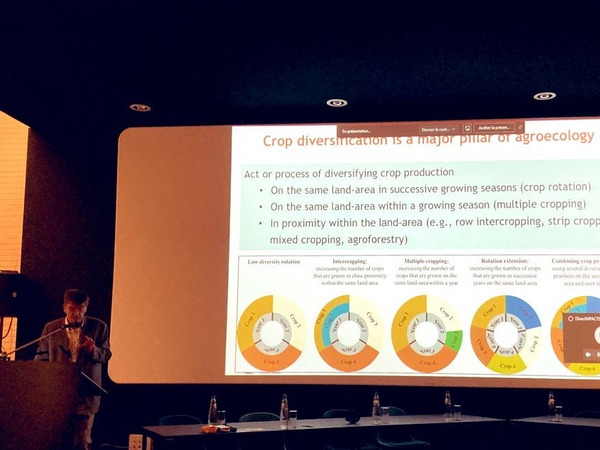Cropping system diversification can play a key role in increasing agri-food systems’ sustainability. Nevertheless, to reach such a target, diversified systems have to be high-yielding, with fewer inputs and lower environmental impacts. At the DiverIMPACTS conference on 29 March 2022, we discussed these challenges as well as how to overcome them.
DiverIMPACTS proposes ingredients to achieve successful crop diversification at the cropping system level. A learning-based process, aiming to improve understanding of the system, is needed to implement these ingredients. Importantly, the design of diversification strategies needs to involve all the actors of the value chains, where technological innovations (e.g., grain sorting from intercrop harvest, adapted varieties) and organisational innovations (e.g., management of low product volumes by the value chain, a tool to define fair price) play an important role for its success. DiverIMPACTS has identified 46 barriers to crop diversification along the value chain, leading to the identification of 200 concrete actions to overcome them and 6 key policy recommendations:
- Monitor the development of crop diversification at the regional, national and EU levels;
- Adapt the Common Agricultural Policy (CAP) to support innovative agroecological practices;
- Reallocate research and development resources towards minor crops;
- Offer financial mechanisms to mitigate or share the innovation & investment costs and risks;
- Support cooperation among actors in undertaking crop diversification or developing innovations; and
- Undertake wide communication campaigns promoting the advantages of minor crops and the consumption of related products.
It is also important to look at the interactions between actors. We underline the need for co-innovation (i.e. collaborative innovation or developing new ideas together). Nevertheless, with such a dynamic, it is difficult to predict where the relationship will end or how it will evolve, which presents challenges for standard results-oriented research funding and planning.
Most of these observations deal with the complexity of diversification. This complexity is reflected in the tools developed to assess the performance of diversification. The tools look at the way to facilitate and automate the diversification pathways and standardized data collection. They can be a valuable resource to address the complexity of crop diversification.
For more information about the event and what was discussed, including recordings of the different sessions, please visit the event website.

 toccare e scorrere fino al comando Aggiungi alla schermata iniziale.
toccare e scorrere fino al comando Aggiungi alla schermata iniziale.